Elevating Student Voice: Reflections From Across the U.S.
CompetencyWorks Blog
CompetencyWorks recently unveiled a fresh graphic illustrating the interconnectedness between elements within the Aurora Institute’s definition of competency-based education (CBE). Crafting a cohesive and just CBE system, one that is unified and equitable, necessitates an all-encompassing approach and a continuous learning mindset, wherein every participant—educators, students, families, community partners, and policymakers—provides leadership and builds capacity to transform school culture, structures, and pedagogy.
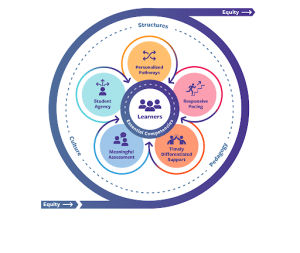
Fostering Agency and Empowering Learners in CBE
In our most recent webinar, Elevating Student Voice: Learning From Across the U.S., we explored the Student Agency element of the CBE elements by exploring three different learning communities across the United States: Kettle Moraine School District, Lindsay Unified School District, and The Young Women’s Leadership School of Astoria.
As learners find agency, they unleash a sense of purpose within their learning journey, persist in the face of challenges, and take charge of their own educational path. This sense of agency is a crucial aspect of CBE. CBE schools engineer environments and immersive experiences that provide students with ample opportunities to cultivate essential skills and mindsets for fostering robust agency, including a growth mindset, self-regulation, and resilience. It’s pivotal to recognize that learning is an active process undertaken by students, not a passive endeavor done to or for them.
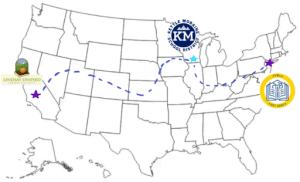 Cheese, Cows, and CBE
Cheese, Cows, and CBE
Wisconsin is renowned for its cheese and cows, and it is the waterpark capital of the world, among other things. Within this vibrant state lies the Kettle Moraine School District in Wales, WI. Kettle Moraine stands out for its unique setup, featuring four high schools coexisting on a single campus and a variety of learning environments spanning elementary and middle school levels. During the webinar, we heard from Briana Medina (myself – haha!), a current intern at the Aurora Institute for CompetencyWorks and an alumna of Kettle Moraine School District.
Kettle Moraine’s graduate profile serves as a commitment to molding KM graduates into valuable contributors to their community. The district’s schools nurture individuals who embody traits essential for success. The attribute of self-directed and resilient individuals truly sets the stage for student agency at Kettle Moraine. This means that students are empowered with the skills to set realistic goals, actively engage in their learning endeavors, seek assistance when needed, and persevere in the face of adversity.
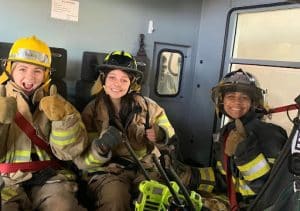 At the High School of Health Sciences (HS²), students engage in diverse career exploration through shadowing opportunities such as fire and rescue, CNA, medical research, and surgery, broadening their understanding of potential career paths. Meanwhile, seniors embark on a transformative journey at KM Perform by creating their senior portfolio projects. They combine content knowledge and graduate profile skill sets to craft projects of their choosing, fostering holistic growth and reflection on their learning experiences. For my own senior portfolio project, I created and led a seminar for 9th-12th-grade students about social justice. The other students and I did a deep dive into five different marginalized groups within the U.S. context and then created interdisciplinary projects that both not only demonstrated content mastery, but spread awareness about our chosen social justice issues.
At the High School of Health Sciences (HS²), students engage in diverse career exploration through shadowing opportunities such as fire and rescue, CNA, medical research, and surgery, broadening their understanding of potential career paths. Meanwhile, seniors embark on a transformative journey at KM Perform by creating their senior portfolio projects. They combine content knowledge and graduate profile skill sets to craft projects of their choosing, fostering holistic growth and reflection on their learning experiences. For my own senior portfolio project, I created and led a seminar for 9th-12th-grade students about social justice. The other students and I did a deep dive into five different marginalized groups within the U.S. context and then created interdisciplinary projects that both not only demonstrated content mastery, but spread awareness about our chosen social justice issues.
Students also have the chance to serve as leadership interns at KM Perform. They help coordinate presentations of learning, conduct school tours, participate in panels on personalized learning, and represent KM Perform at conferences alongside staff. Additionally, KM Global students embark on semester-long inquiry projects tailored to individual interests and passions, nurturing content mastery aligned with their academic goals and deep dives into graduate profile attributes.
Welcome to the Golden State (of Student Agency!)
Next, we heard from Lindsay Unified School District in the Golden State, California. With its strategic vision, Lindsay Unified embarked on its journey with CBE 15 years ago, driven by extensive conversations with the community to shape its vision of learning. Cinnamon Scheufele, a Executive Director of C&I at Lindsay Unified, and Christine McJunkin, the Director of Special Projects at Lindsay Unified, described the transformative ways that student voice is centered in their learning environments. While the terms “agency” or “student choice and voice” often evoke images of older students transitioning into high school, at Lindsay, an intentional introduction of agentic practices starts at a much earlier stage. Through a collaborative effort with Transcend, Lindsay Unified now emphasizes fostering agency among students as young as kindergarten. A key to this has been enacting the “agentic cycle,” a process involving setting meaningful goals, making plans, taking action, and then reflecting and revising.
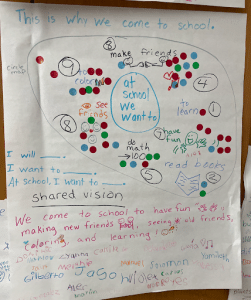 Lindsay also uses project-based learning as a gateway to student agency by engaging students in real-world, hands-on projects where they are encouraged to take ownership of their learning journey. This approach not only fosters a deep understanding of academic content but also nurtures student agency and prepares students for success in an ever-changing world. Cinnamon spoke to how their focus on agency and PBL is situated within the larger context of a coherent performance-based system. For example, they have created equitable grading policies. She noted, “We haven’t averaged grades for a very long time because that really does penalize learning that has already occurred. Separating work habits from academic mastery is another way that we have made sure that if you turn things in late all the time, that’s more of a life habit.” These insights highlight the cohesive nature of Lindsay Unified School District’s approach to a holistic system that prioritizes genuine learning to prepare students to thrive in an evolving society.
Lindsay also uses project-based learning as a gateway to student agency by engaging students in real-world, hands-on projects where they are encouraged to take ownership of their learning journey. This approach not only fosters a deep understanding of academic content but also nurtures student agency and prepares students for success in an ever-changing world. Cinnamon spoke to how their focus on agency and PBL is situated within the larger context of a coherent performance-based system. For example, they have created equitable grading policies. She noted, “We haven’t averaged grades for a very long time because that really does penalize learning that has already occurred. Separating work habits from academic mastery is another way that we have made sure that if you turn things in late all the time, that’s more of a life habit.” These insights highlight the cohesive nature of Lindsay Unified School District’s approach to a holistic system that prioritizes genuine learning to prepare students to thrive in an evolving society.
Big Apple Brilliance: Cultivating Student Leadership at TYWLS of Astoria
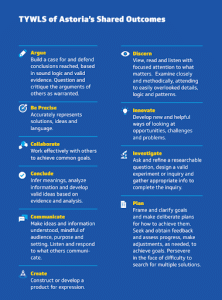 Nestled in the bustling metropolis of the Big Apple, The Young Women’s Leadership School of Astoria (TYWLS) stands as a beacon of single-sex public education within the New York City Public Schools system. During our webinar, teacher and instructional coach, Greg Zimdahl, shared insights and we learned from the perspectives of two seventh-grade students, Karina and Yadiira.
Nestled in the bustling metropolis of the Big Apple, The Young Women’s Leadership School of Astoria (TYWLS) stands as a beacon of single-sex public education within the New York City Public Schools system. During our webinar, teacher and instructional coach, Greg Zimdahl, shared insights and we learned from the perspectives of two seventh-grade students, Karina and Yadiira.
At its inception, TYWLS took on the challenge of defining its educational approach to empowering student agency. To address this, they posed two pivotal questions:
-
-
-
- How can we foster a shared language about learning?
- Once established, what spaces and opportunities can we create for students to engage in dialogue about their learning experiences?
-
-
These inquiries sparked the development of shared outcomes, representing mastery goals that transcend grade levels and subjects. Each outcome is accompanied by a shared rubric, unpacked by students and teachers. These tools serve as benchmarks for student self-assessment and peer evaluation and facilitate constructive feedback from staff members. Additionally, every student has an advisor that they meet with every other day to engage in one-on-one coaching that is student-facilitated.
Students utilize their digital portfolios not only to compile evidence of their learning but also to navigate their learning goals. These portfolios and the digital grading platform serve as a cornerstone for guiding discussions with their advisors, setting personalized goals, and articulating their strengths and areas for growth. Moreover, students actively participate in student-led conferences twice a year, extending invitations to their parents, caretakers, and family members to partake in these meaningful conversations.
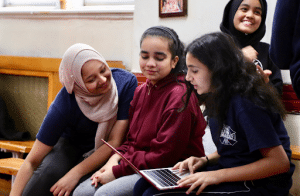 At TYWLS, student involvement is prioritized in designing frameworks that shape students’ educational experience. Two key programs exemplify this commitment. Firstly, the Mastery Team, composed of 8 or 9 teachers, meets monthly to refine the TYWLS approach to mastery-based learning. A few years back, invitations were extended to students to apply for the role of Master Youth Ambassador. These students now actively participate in meetings, serving as the voice of their peers and contributing to decisions regarding grading and the evolution of their competency-based education systems. Additionally, the Student Juto group, which convenes once or twice a month, includes two representatives from each grade level. Together with administration and instructional coaches, they deliberate on matters such as uniform and tech policies to ensure student perspectives are integrated into school-wide decisions. Through these initiatives, TYWLS aims to foster a shared language of learning and empower students to play a pivotal role in shaping equitable, student-driven systems and structures.
At TYWLS, student involvement is prioritized in designing frameworks that shape students’ educational experience. Two key programs exemplify this commitment. Firstly, the Mastery Team, composed of 8 or 9 teachers, meets monthly to refine the TYWLS approach to mastery-based learning. A few years back, invitations were extended to students to apply for the role of Master Youth Ambassador. These students now actively participate in meetings, serving as the voice of their peers and contributing to decisions regarding grading and the evolution of their competency-based education systems. Additionally, the Student Juto group, which convenes once or twice a month, includes two representatives from each grade level. Together with administration and instructional coaches, they deliberate on matters such as uniform and tech policies to ensure student perspectives are integrated into school-wide decisions. Through these initiatives, TYWLS aims to foster a shared language of learning and empower students to play a pivotal role in shaping equitable, student-driven systems and structures.
As we continue to build momentum in the field of CBE, student agency and leadership can play an integral role in creating meaningful and equitable educational experiences. By embracing the CBE elements and fostering a culture of collaboration and innovation, we can work towards building a future where every student has the opportunity to thrive and succeed.
Learn More
- Reflections on Learning Without Boundaries at Kettle Moraine
- Strong Evidence of Competency-Based Education’s Effectiveness from Lindsay Unified School District
- A Handbook for Change: Empowering Learner Agency at TYWLS of Astoria
- CBE Starter Pack 1: Students are Empowered Daily
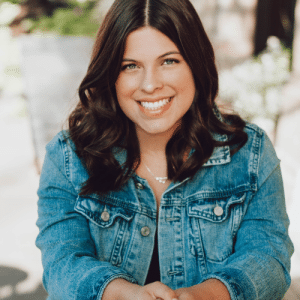 Briana Medina joined the Aurora Institute in May 2023 as a CompetencyWorks intern. She is a junior at the University of Wisconsin-Madison studying Political Science and Education Studies. She is committed to educational equity and passionate about its relation to competency-based learning. She currently serves on the UW-Madison College of Letters and Science Curriculum Committee, where she reviews and recommends course and program additions, revisions, and policies relating to academic offerings. In the past, Briana has worked as an intern at Kettle Moraine School for Arts and Performance, giving tours and teaching in a competency-based learning environment. Additionally, she worked with the Institute for Personalized Learning panel discussions, high-level presentations, and blog posts.
Briana Medina joined the Aurora Institute in May 2023 as a CompetencyWorks intern. She is a junior at the University of Wisconsin-Madison studying Political Science and Education Studies. She is committed to educational equity and passionate about its relation to competency-based learning. She currently serves on the UW-Madison College of Letters and Science Curriculum Committee, where she reviews and recommends course and program additions, revisions, and policies relating to academic offerings. In the past, Briana has worked as an intern at Kettle Moraine School for Arts and Performance, giving tours and teaching in a competency-based learning environment. Additionally, she worked with the Institute for Personalized Learning panel discussions, high-level presentations, and blog posts.